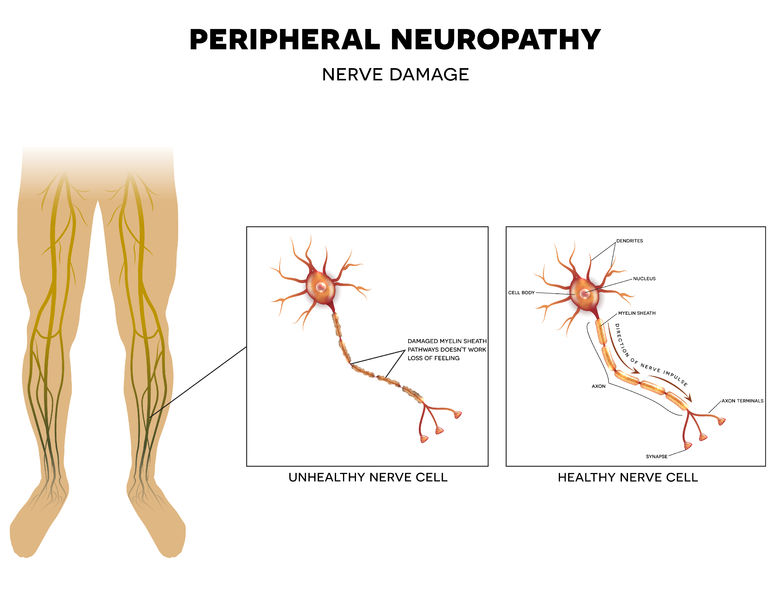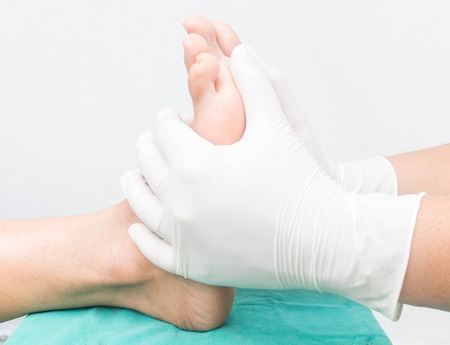
Neuropathy
Neuropathy occurs when nerves of the peripheral nervous system (the part of the nervous system outside of the brain and spinal cord) are damaged. Most often, the damage is located along the nerve cell’s axon, a nerve fiber that carries electrical impulses away from the cell body.
Generally referred to as peripheral neuropathy, the condition usually causes pain and numbness in the hands and feet. It can result from traumatic injuries, infections, metabolic disorders and exposure to toxins. One of the most common causes is diabetes.
Neuropathy can affect motor nerves, which control muscle movement, and sensory nerves, which detect sensations such as coldness or pain. In some cases – known as autonomic neuropathy – it can affect internal organs, such as the heart, blood vessels, bladder or intestines.
Pain from peripheral neuropathy is often described as a tingling or burning sensation. Symptoms often improve with time – especially if the neuropathy is due to an underlying condition that can be cured. Neuropathy is often associated with poor nutrition, diseases, and pressure or trauma, but many cases have no known cause (called idiopathic neuropathy).
In the United States, about 20 million people suffer from neuropathy.

How is neuropathy classified?
Peripheral neuropathy is broadly classified in the following categories:
- Mononeuropathy – involvement of a single nerve. Examples include carpal tunnel syndrome, ulnar nerve palsy, radial nerve palsy and peroneal nerve palsy.
- Multiple mononeuropathy – two or more nerves individually affected.
- Polyneuropathy – generalized involvement of peripheral nerves. Examples include diabetic neuropathy and Guillain-Barre syndrome.
Neuropathies also are categorized by functional classification (motor, sensory, autonomic, or mixed) or by the type of onset – acute (hours or days), subacute (weeks or months) or chronic (months or years).
The most common form of neuropathy is symmetrical peripheral polyneuropathy, which mainly affects the feet and legs on both sides of the body.

The most common form of neuropathy is (symmetrical) peripheral polyneuropathy, which mainly affects the feet and legs on both sides of the body.
What causes Neuropathy?
About 30% of neuropathy cases are considered idiopathic, which means their cause is unknown while another 30% of neuropathies are due to diabetes. In fact, about 50% of people with diabetes develop some type of neuropathy. The remaining cases of neuropathy, called acquired neuropathies, have several possible causes, including:
- Trauma or pressure on nerves, often from a cast or crutch or repetitive motion such as typing on a keyboard.
- Nutritional problems and vitamin deficiencies, often from a lack of B vitamins.
- Alcoholism, often through poor dietary habits and vitamin deficiencies.
- Autoimmune diseases, such as lupus, rheumatoid arthritis and Guillain-Barre syndrome.
- Tumors, which often press up against nerves.
- Other diseases and infections, such as kidney disease, liver disease, Lyme disease, HIV/AIDS or an underactive thyroid (hypothyroidism).
- Inherited disorders (hereditary neuropathies), such as Charcot-Marie-Tooth disease and amyloid polyneuropathy.
- Poison exposure from toxins such as heavy metals, certain medications and cancer treatments.
Who gets neuropathy?
Risk factors for peripheral neuropathy include several conditions and behaviors. People with diabetes who poorly control their blood sugar levels are likely to suffer from neuropathy. Autoimmune diseases such as lupus and rheumatoid arthritis also increase one’s chances of developing neuropathy. People who have received organ transplants, AIDS patients and others who have had some type of immune system suppression have a higher risk of neuropathy. In addition, those who abuse alcohol or have vitamin deficiencies (especially B vitamins) are at increased risk. Neuropathy is also more likely to occur in people with kidney, liver or thyroid disorders.